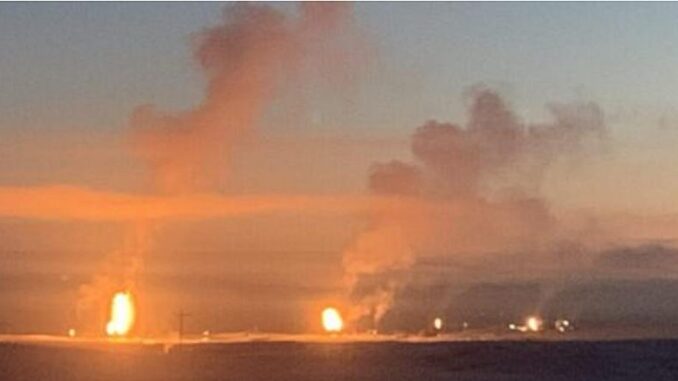
BISMARK, North Dakota, July 15, 2024 (ENS) – The U.S. Justice Department and Environmental Protection Agency have announced a settlement with Marathon Oil Company resolving Clean Air Act violations at the company’s oil and gas production operations on the Fort Berthold Indian Reservation in central-western North Dakota.
The settlement requires that Marathon pay a civil penalty of $64.5 million, the largest ever for violations of the Clean Air Act at stationary sources, which include facilities such as oil and gas tank systems.
Under the settlement agreement, Marathon will implement extensive compliance measures to achieve major reductions in harmful emissions from over 200 facilities across the state, including lands on both sides of the Missouri River.
That number includes nearly 90 oil and natural gas production facilities on the Fort Berthold Indian Reservation.
“This historic settlement – the largest ever civil penalty for violations of the Clean Air Act at stationary sources – will ensure cleaner air for the Fort Berthold Indian Reservation and other communities in North Dakota, while holding Marathon accountable for its illegal pollution,” said Attorney General Merrick Garland.
“The complaint alleges that Clean Air Act violations at nearly 90 Marathon facilities resulted in thousands of tons of illegal emissions. The work that Marathon will do under this agreement will result in the equivalent of over 2.25 million tons of reduced carbon-dioxide emissions over the next five years and also eliminate nearly 110,000 tons of VOC emissions. The Justice Department will continue to vigorously enforce our environmental laws to protect the health of the American people,” Garland said.
The agreement requires Marathon to invest in extensive compliance measures estimated to cost $177 million, much of which will be expended by the end of 2024.
The settlement requires Marathon to obtain permits with federally enforceable emissions limits at production facilities on the Fort Berthold Indian Reservation and future operations in the state of North Dakota. Compliance measures also include flare monitoring, periodic infrared camera inspections and implementation of storage tank design requirements.
The case is the first of its kind against an oil and gas producer for violations of major source emissions permitting requirements under the Clean Air Act’s Prevention of Significant Deterioration program.
While Marathon is the nation’s 22nd largest producer of oil based on 2022 data, it is the seventh largest emitter of greenhouse gas emissions in the oil and gas industry.
Additionally, greenhouse gases, including methane, were released in large quantities, contributing to climate change.
A large portion of these emissions come from flaring, an industry practice that combusts but also releases methane, a climate super-pollutant. The work that Marathon will do under this agreement will result in the equivalent of over 2.25 million tons of reduced carbon-dioxide emissions over the next five years, similar to the amount of reductions achieved by taking 487,000 cars off the road for one year. The settlement will also eliminate nearly 110,000 tons of VOC emissions.
“The record civil penalty and extensive compliance measures, including an innovative cap on VOC emissions, set a benchmark for the Department’s enforcement efforts at oil and gas production facilities,” said Acting Associate Attorney General Benjamin Mizer.
“Those who are historically overburdened by pollution are the most at risk of being harmed by these emissions. The Justice Department is committed to enforcing laws such as the Clean Air Act to protect the health of everyone in the United States, including Tribal Nations and their members,” Mizer said.
“Today’s historic settlement is the most significant to date under EPA’s climate enforcement initiative as well as part of a larger effort to hold oil and gas companies accountable for widespread violations at oil and gas facilities throughout the country,” said Assistant Administrator David Uhlmann of EPA’s Office of Enforcement and Compliance Assurance.
“As a result of today’s settlement, Marathon will dramatically cut its emissions, including the release of methane, a climate super-pollutant that is 25 times more potent in the near term than carbon dioxide. EPA is committed to doing everything possible to limit climate change and ensure a sustainable future,” Uhlmann said.
“This settlement is a major win for the health and future of our Tribal communities, including people and families who are often overburdened by pollution,” said KC Becker, EPA Region 8 Administrator. “As a result of the agreement, Marathon has and will continue to take comprehensive measures to come into compliance and reduce harmful emissions across hundreds of production sources. These investments will improve air quality and reduce respiratory illnesses across the Fort Berthold Indian Reservation and western North Dakota.”
By the end of 2024, Marathon Oil is required to comply in ways that will result in 2.25 million fewer tons of carbon monoxide emissions. According to the EPA, that’s equivalent to removing almost half a million cars off the road for a year.
Featured image: Methane gas flaring from Marathon Oil wells on the Fort Berthold Indian Reservation, North Dakota, February 8, 2019 (Photo by James Brugh courtesy “Buffalo Fire”)
© 2024, Environment News Service. All rights reserved. Content may be quoted only with proper attribution and a direct link to the original article. Full reproduction is prohibited.



